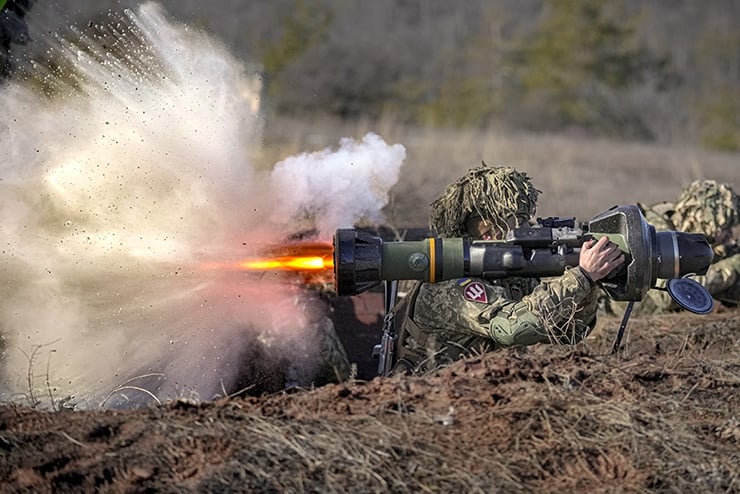One recent morning an opinion piece by Jennifer Rubin of The Washington Post arrived unbidden in my email inbox.
“Should Putin act, it would arguably be the greatest provocation since the end of the Cold War,” Rubin claimed. “Like the Berlin Wall and the blockade of Berlin before that, movement into Ukraine would be a direct challenge to the West’s commitment to democracy, to the territorial integrity of European allies and to the credibility of the United States on the world stage.”
It is natural to question the wisdom of risking war with Russia in order to defend borders originally drawn by Soviet politicians. Those long-dead Soviets never imagined a day when Ukraine would not be part of the polity controlled from Moscow. But to Rubin, people who raise this reasonable objection, like Fox News host Tucker Carlson and Sen. Josh Hawley (R-Mo.), are guilty of “recycl[ing] Russian talking points.” Rubin does not spare even her current heartthrob: “The president can say ‘America is back’ all he wants. But it means nothing at all unless the United States can lead an effective response against authoritarian aggressors.”
It would be easy to dismiss Rubin’s warmongering essay, and the many others like it, as hysterical, illogical, and ignorant. But so were the arguments trotted out to justify every American intervention since the end of the Cold War. Those bad arguments still carried the day, however, because opponents of war found themselves drawn into arguing that the side opposing the United States was in the right. Some carried that thought even further by arguing that what ordinary American servicemen were doing in those wars was wrong. If conservatives actually want to stop war with Russia, they need to realize that there is one, and only one, reason to oppose it: a war with Russia would hurt America and Americans.
Rubin and her ilk are eager to debate the legitimacy of Ukrainian nationalism, the record of Vladimir Putin, the comparative moral state of America and Russia, and whether the Russians actually perceive NATO as a threat and, if they do, whether that fear is justified. She knows that Americans who instinctively trust the military outnumber those who don’t (though trust has recently declined), just as instinctive American Russophobes outnumber instinctive American Russophiles. Thus it would be a disaster for anti-war conservatives if the American public begins to associate opposition to war against Russia with disdain for the American military, admiration for Vladimir Putin, or affinity for all things Russian.
The American public needs to be reminded instead that one can oppose war with Russia and still think that Russia is wrong to threaten its neighbors. One can oppose war with Russia and still think its claim to being threatened by a handful of American troops in Poland is as believable as the old Tsarist and Communist claims of being threatened by the very existence of Poland. One can oppose war with Russia yet believe that, on the whole, Russia’s role in world politics has been malign.
As a Russophobe for Peace, I realize that the only reason for America to go to war is to defend America and Americans. This position reframes the war debate in a way Rubin and the rest of the Beltway bombardiers desperately want to avoid. What made the Soviet Union the mortal threat that Tsarist Russia was not was its Communist ideology seeking world domination, which had covert support in many corners of the West and overt sympathy in many more. Many Americans thought that Tsarist Russia was cruel, repressive, and backward, but none thought it was a threat to us. Neither is Putin’s Russia.
The other discussion Rubin and friends desperately want to avoid is one focusing on what a war with Russia would mean for ordinary Americans. Our country is broke and, outside of a few privileged enclaves, literally falling apart. As we spent the last three decades pouring trillions of dollars into Mideast wars serving no vital American interest, our roads and bridges began to crumble, and our airports began to resemble bus terminals. About 50,000 factories and millions of factory jobs disappeared, and one dependable American institution after another was transformed into a wreck that routinely let down those it was supposed to serve.
Rubin and friends are blithely indifferent to these increasingly obvious signs of American decline. Those who live in or profit from the Beltway see endless war as an advantage, since the money lavished on the Pentagon helps them to continue the lifestyle to which they have grown accustomed. Ike was right about the military-industrial complex.
Fighting to keep the Russians out of Ukraine doesn’t seem like such a good deal to the Americans living in the cities that have been left to die by DC, and whose sons are still being asked to die in the wars DC demands. That is what we anti-war conservatives should start talking about. Indeed, on that topic, we should never shut up.
A Ukrainian serviceman fires an anti-tank weapon during an exercise in the Joint Forces Operation, in the Donetsk region of eastern Ukraine on Feb. 15, 2022. (Vadim Ghirda / Associated Press)

Leave a Reply